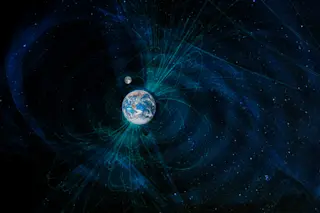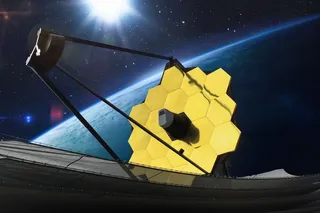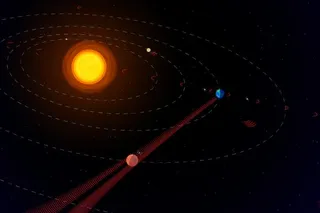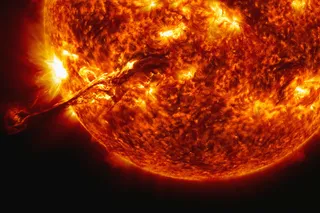Explorers have long trusted compasses to navigate Earth’s land and oceans, using our planet’s global magnetic field as their guide.
But what happens when you take a compass beyond Earth — into orbit, to the Moon, to other planets, or even beyond our solar system? Would it still point north, or would it aimlessly spin in the absence of a dominant magnetic field? The answer depends on where you are in the cosmos and what other magnetic fields are at play.
On Earth, a compass needle aligns with our planet’s geomagnetic field, which is generated by the movement of molten iron in Earth’s outer core. This strong, bullet-shaped global magnetic field extends far beyond the surface of our planet. But as you venture farther and farther into space, the compass behavior can change.
A Compass in Earth's Orbit
Earth’s magnetic field, called the magnetosphere, bubbles out thousands of miles beyond Earth’s surface. But in low Earth orbit (LEO) — where the International Space Station (ISS) circles the planet at an altitude of about 250 miles — Earth’s magnetic field is nearly as strong as it is on the surface.
That means a compass still works in orbit, aligning itself with Earth's magnetic north. (That is, provided there are no other strong magnets nearby.)
However, coronal mass ejections (CMEs) and more powerful geomagnetic storms from the Sun can also interact with and disturb Earth’s magnetosphere, which can affect the direction a compass will point, especially the farther out you get. These fluctuations mean that although a compass in orbit would still roughly point north, it wouldn’t be reliable enough for precise navigation.
For example, even on Earth’s surface, “navigation by compass is especially difficult during either of these magnetic storms because compass bearing can change by 10 degree or more during the course of a few hours,” according to a NASA educator guide.
Read More: How Does Earth’s Magnetic Field Work?
Does a Compass Work on the Moon?
The Moon, unlike Earth, no longer has a global magnetic field. This means a traditional compass will not work there. However, the Moon is not entirely devoid of magnetism. Certain lunar rocks have been found to have remanent magnetism — meaning they were once exposed to a strong magnetic field billions of years ago and still produce weak, localized magnetic fields.
Scientists do believe the Moon had a magnetic field billions of years ago that was roughly comparable in strength to Earth’s, generated by a now-extinct molten core dynamo. This ancient field likely even connected with Earth’s, according to NASA, creating a protective magnetosphere that shielded both bodies from solar wind and geomagnetic storms.
But today, without a global magnetic field to guide it, a compass on the Moon would be useless.
A Compass on Different Planets
Magnetic fields vary widely across the solar system, which means a compass would behave differently on each planet:
Mercury
This small, rocky planet has a weak but detectable global magnetic field, only about 1 percent the strength of Earth’s. A compass on Mercury could align with the field, but the needle's movements would be much more sluggish, and the direction it points could easily be influenced by the solar wind and the Sun’s powerful magnetic field.
Venus
Venus lacks an internally generated global magnetic field entirely. Therefore, a compass on the hellish planet would be as useless as one on the Moon. However, the compass may still act erratically if Venus has localized regions of magnetized crust, though evidence of this is still lacking.
Mars
Although Mars no longer has a global magnetic field, it did have one like Earth’s until about 3.5 billion years ago. And certain regions of Mars still contain remnants of that ancient global field embedded in the crust. A compass might react in some of these areas, but it wouldn’t reliably function.
Jupiter
The gas and ice giants have intense magnetic fields, far stronger than Earth’s. A compass near Jupiter, for instance, would be overwhelmed by the planet’s complex and extremely powerful magnetosphere — which is some 20,000 times the strength of Earth’s.
Saturn
Meanwhile, Saturn’s magnetic field is nearly perfectly aligned with its rotational axis, so a compass on the ringed planet might behave a bit more predictably.
Uranus and Neptune
Uranus and Neptune have magnetic fields that are both multipolar and tilted at extreme angles relative to their rotation, so a compass needle on either of these ice giants would act erratically and unpredictably.
Read More: The Magnetic North Pole Is Drifting Across the Arctic Toward Siberia
A Compass Outside the Solar System
Near the heliopause — the boundary where the Sun’s magnetic field gives way to the interstellar medium — a compass would be primarily influenced by the magnetic fields of the Milky Way itself. However, these interstellar magnetic fields are extremely weak.
In the Milky Way’s galactic magnetic field, the force is so weak that a standard compass would be virtually useless. Although a traditional compass would essentially become dead weight between stars, galactic magnetic fields are still important because they help shape cosmic structures like nebulae and influence high-energy particles throughout the universe.
Navigating the Cosmos
For human and robotic explorers venturing beyond Earth, far more advanced navigation tools have replaced the simple compass. Whether it’s GPS, star trackers, or onboard magnetometers, space agencies have developed extremely reliable ways to traverse the cosmos.
Still, imagining the behavior of a compass in environments far beyond Earth offers a fascinating glimpse into the invisible forces that shape our universe.
Article Sources
Our writers at Discovermagazine.com use peer-reviewed studies and high-quality sources for our articles, and our editors review for scientific accuracy and editorial standards. Review the sources used below for this article:
NASA. Earth’s Magnetosphere: Protecting Our Planet from Harmful Space Energy
Science Partner Journals. Evolution of the Lunar Magnetic Field
Science Advances. When the Moon had a magnetosphere
NASA. Venus Facts
NASA. Mars Global Surveyor
Geophysical Research Letters. A close-up view of Jupiter's magnetic field from Juno: New insights into the planet's deep interior
The Royal Society. The underexplored frontier of ice giant dynamos
Stanford University. Astrophysical Magnetism and the Interstellar Medium
Science Direct. Interstellar Magnetic Field














